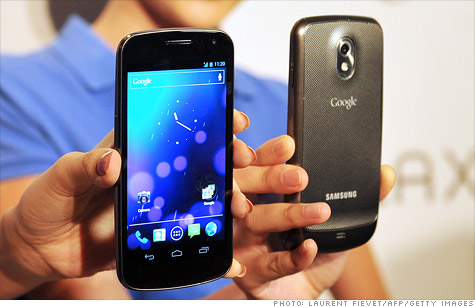Search News

Google's chairman Eric Schmidt said that Android's not fragmented, it's 'differentiated' during CES panel in Las Vegas.
LAS VEGAS (CNNMoney) -- Technology innovations are often blended into buzzword trends like "curation" and "social graph." This is shaping up to be the year of "ecosystem."
What does that mean? Depends on who you ask. Google (GOOG, Fortune 500) chairman Eric Schmidt offered up his view during a panel discussion at the Consumer Electronics Show in Las Vegas on Tuesday.
Schmidt started with a canned answer about how he defines ecosystem -- "scalable network platforms that deliver the best customer value" -- but he warmed up when the talk turned to Google's Android operating system.
"We even have Android in refrigerators now," Schmidt said. "By open-source we mean, 'take it and have fun.' And people have."
The panel moderator, CNET's Molly Wood, pointed out the pitfall of that strategy: hundreds of devices are running dozens of various versions of Android. But as soon as she said the word "fragmentation," Schmidt cut her off.
"You have to be careful with that word, fragmentation," he said.
"So what would you say?" Wood asked.
"I would say differentiation," Schmidt replied. "Differentiation is positive, fragmentation is negative."
Whatever you call it, the approach is working: Google activated 3.7 million Android phones on Christmas Eve and Christmas Day, Schmidt revealed.
But Wood pressed the fragmentation issue, asking Schmidt whether the new Android operating system -- 4.0, codenamed Ice Cream Sandwich -- is a chance to "give [Google] a little more control."
Schmidt replied: "Well, control ... I mean, we want to get everybody under Ice Cream Sandwich, but we absolutely allow our developers to add or change anything, as long as they're not breaking anything."
He added: "The great thing is if you don't like one phone, you can choose another. You're not bound to certain hardware."
That potshot was aimed at Apple, whose iOS appears only on its own devices.
Schmidt's digs at competitors continued when Wood brought up Internet-connected TV and the success of Microsoft's (MSFT, Fortune 500) gesture-controlled Kinect system.
"How big a barrier is it that Microsoft seems to have all the pieces in place, with the Kinect and the Xbox and all, but hasn't really gotten it together yet?" Wood asked.
"Microsoft is trapped in an architectural problem it might not get through," Schmidt replied.
The blunt comment drew a few laughs from the audience. Schmidt shrugged them off saying, "My sense is that they're going to get there. It's a problem of user interface design. It's a matter of getting people with great taste into the company, designing."
Next on Schmidt's slam list: Amazon (AMZN, Fortune 500), whose Kindle Fire tablet runs on a highly altered version of Android. Schmidt said Google welcomed the customization, but that the tablet "has some limitations, [which] have been well documented."
Wood tried to close the discussion with a question based on the panel's theme: "Which is most important for the ecosystem: Hardware, content, services or software?"
Schmidt went the politician's route. He tossed that query out and swapped in his own.
"They work together," he said. "I'll answer a different question: What was the most surprising thing in 2011?" Schmidt asked himself, as attendees laughed.
"It's always surprising to people when they realize how significant these ecosystems are," he continued. "I saw this with respect to Apple, Amazon and even Facebook."
The open ecosystem allows multiple types of players to work together, Schmidt said. That means "everyone can be a winner" in a financial sense.
"All of these people can operate without your knowledge or control," he said. "It's about making it open enough so that the creative people, the app developers, the consumers -- you build something tremendously valuable for everyone." ![]()